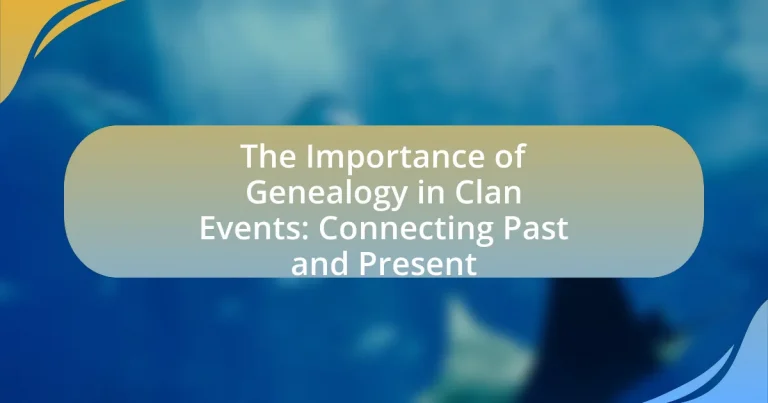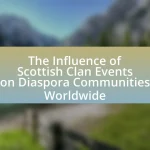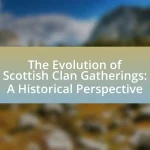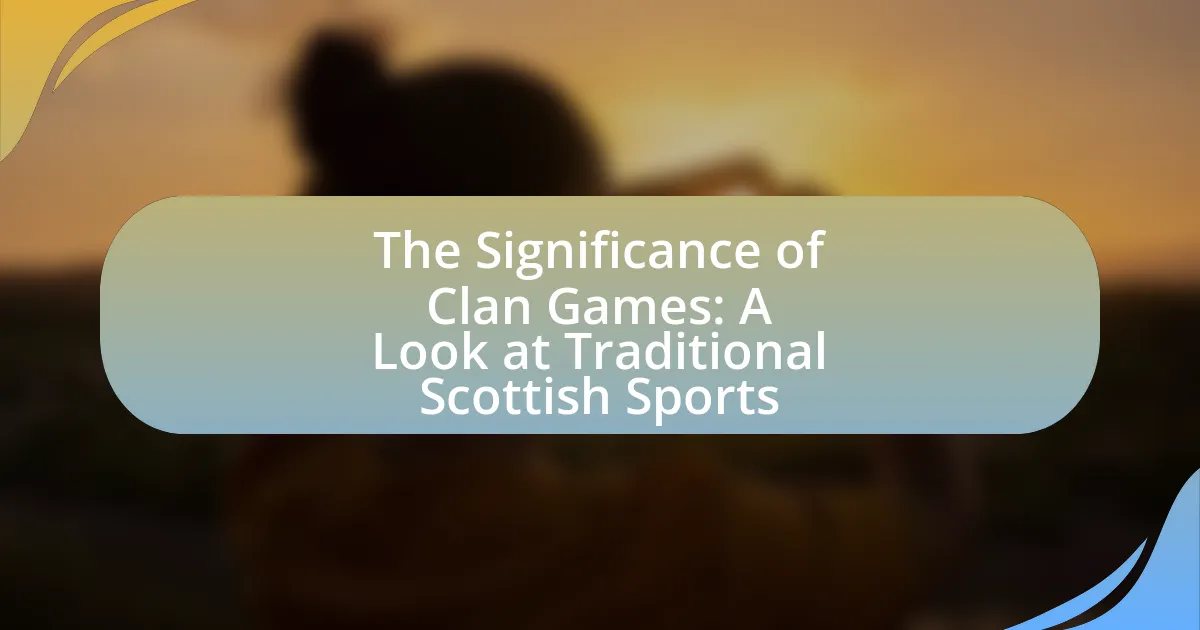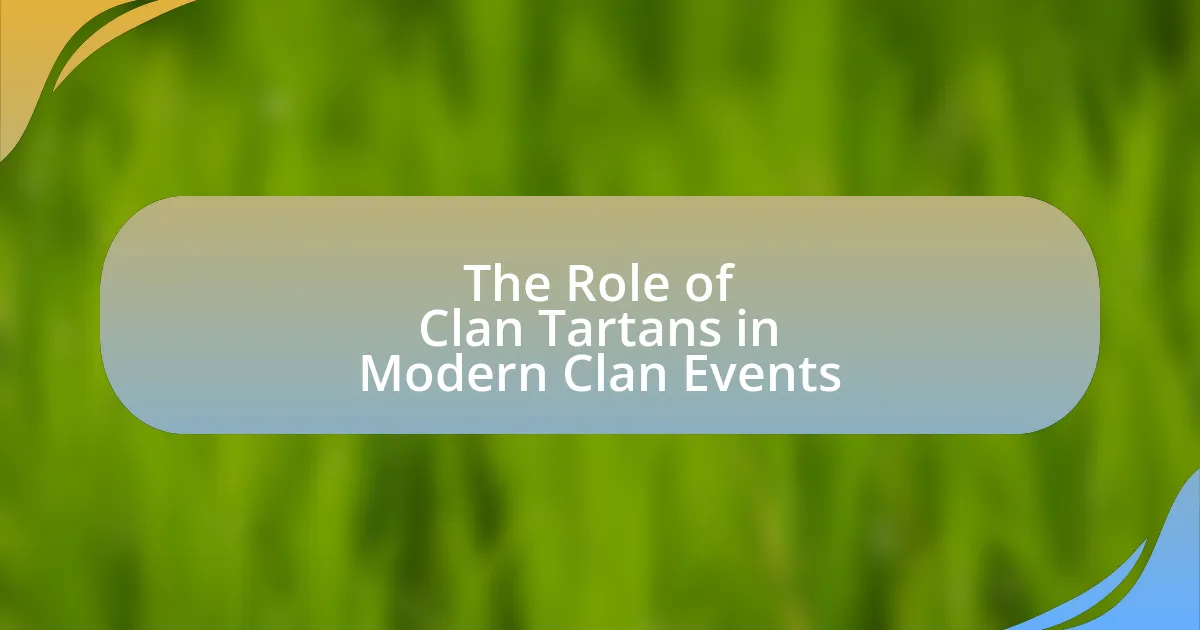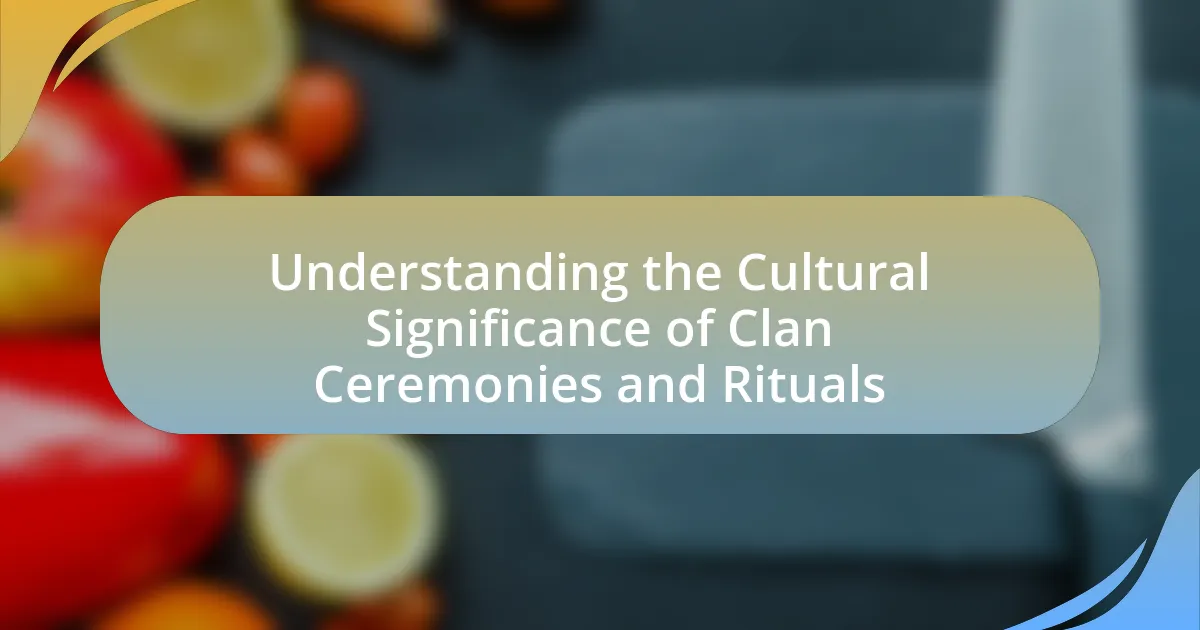The article focuses on the significance of genealogy in clan events, emphasizing its role in establishing identity and belonging among members. It explores how tracing lineage enhances understanding of clan heritage, strengthens family ties, and fosters a sense of community through shared narratives and traditions. Key elements such as lineage, ancestral connections, and shared heritage are discussed, along with methods for integrating genealogy into clan gatherings, including storytelling and technology. The article also addresses challenges in genealogical integration and highlights best practices for ensuring inclusivity and engagement across generations, ultimately showcasing the benefits of genealogy-focused events in preserving cultural identity and enhancing familial bonds.
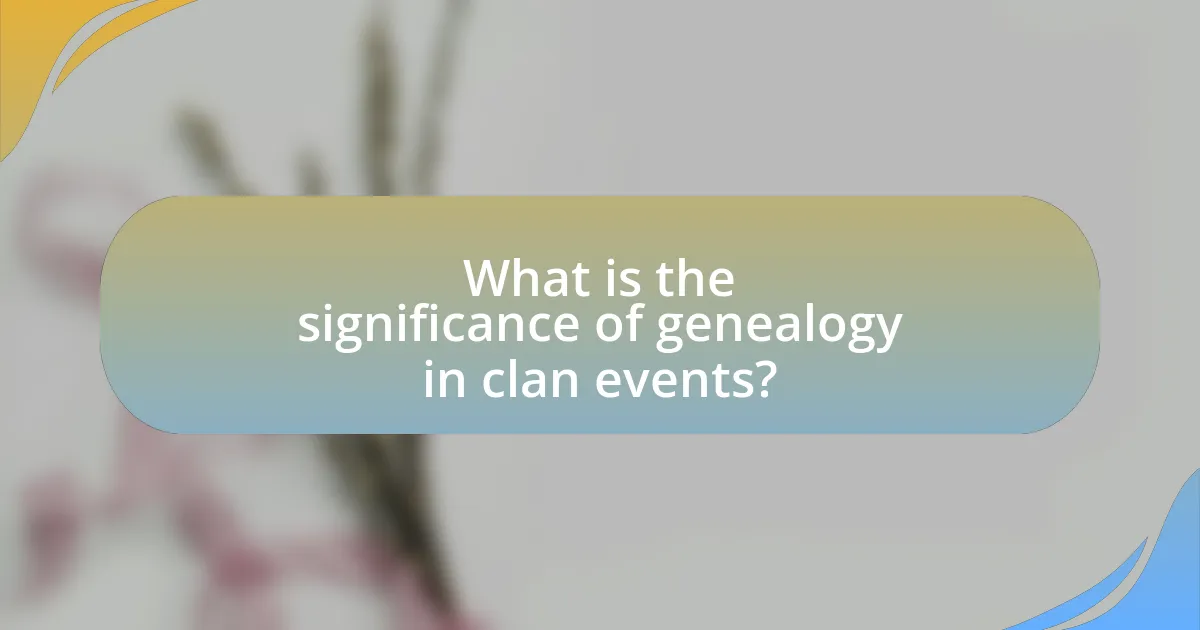
What is the significance of genealogy in clan events?
Genealogy is significant in clan events as it establishes a sense of identity and belonging among members. By tracing lineage, clans reinforce their historical narratives and cultural heritage, which fosters unity and continuity. For instance, many clans celebrate ancestral ties during gatherings, emphasizing the importance of shared history and familial connections. This practice not only honors past generations but also strengthens current relationships, ensuring that traditions and values are passed down through generations.
How does genealogy enhance the understanding of clan heritage?
Genealogy enhances the understanding of clan heritage by providing a structured framework to trace lineage and familial connections. This systematic approach allows individuals to uncover ancestral histories, revealing the cultural, social, and historical contexts that shaped their clan’s identity. For instance, genealogical research can identify significant events, migrations, and relationships that have influenced clan dynamics over generations, thereby enriching the collective memory and sense of belonging within the clan. Furthermore, studies have shown that engaging in genealogy fosters a deeper appreciation for shared heritage, as individuals connect with their ancestors’ experiences and values, reinforcing clan unity and continuity.
What are the key elements of genealogy that relate to clan identity?
The key elements of genealogy that relate to clan identity include lineage, ancestral connections, and shared heritage. Lineage establishes the direct descent from common ancestors, which is crucial for defining clan membership. Ancestral connections highlight the relationships among clan members, reinforcing social bonds and collective identity. Shared heritage encompasses cultural traditions, values, and historical narratives that unite clan members, fostering a sense of belonging and continuity. These elements collectively contribute to the understanding and preservation of clan identity across generations.
How does genealogy contribute to the preservation of family stories?
Genealogy contributes to the preservation of family stories by systematically documenting lineage and familial connections, which helps to maintain a narrative of shared history. This documentation often includes personal anecdotes, historical events, and cultural traditions that are passed down through generations. For instance, genealogical research can uncover stories about ancestors’ experiences, such as migration patterns or significant life events, which enrich the family’s collective memory. Additionally, organizations like the National Genealogical Society provide resources and frameworks for families to compile and share their histories, ensuring that these stories are not lost over time.
Why is connecting past and present important in clan gatherings?
Connecting past and present in clan gatherings is important because it fosters a sense of identity and continuity among members. This connection allows individuals to understand their heritage, which strengthens familial bonds and community ties. Historical narratives and shared experiences are often recounted during these gatherings, reinforcing the clan’s values and traditions. For instance, clans that celebrate their ancestry through storytelling or rituals often report increased cohesion and mutual support among members, as evidenced by studies showing that shared history enhances group identity and belonging.
How do clan events foster a sense of belonging through genealogy?
Clan events foster a sense of belonging through genealogy by creating a shared identity among participants based on their ancestral connections. These gatherings often include activities such as storytelling, family tree presentations, and cultural rituals that emphasize the lineage and heritage of the clan. For example, research indicates that individuals who engage in genealogical activities report higher levels of social connectedness and emotional well-being, as they feel part of a larger narrative that transcends generations. This communal experience reinforces familial ties and cultivates a collective memory, thereby strengthening the bonds among clan members and enhancing their sense of belonging.
What role does genealogy play in strengthening family ties during events?
Genealogy plays a crucial role in strengthening family ties during events by providing a shared sense of identity and belonging among family members. When families gather for events, knowledge of their ancestry fosters connections through shared stories, traditions, and heritage, which enhances emotional bonds. Research indicates that understanding family history can increase familial cohesion; for instance, a study published in the Journal of Family History found that individuals who engage with their genealogy report higher levels of family satisfaction and connection. This shared understanding of lineage not only reinforces relationships but also encourages the passing down of cultural values and traditions, making family events more meaningful.
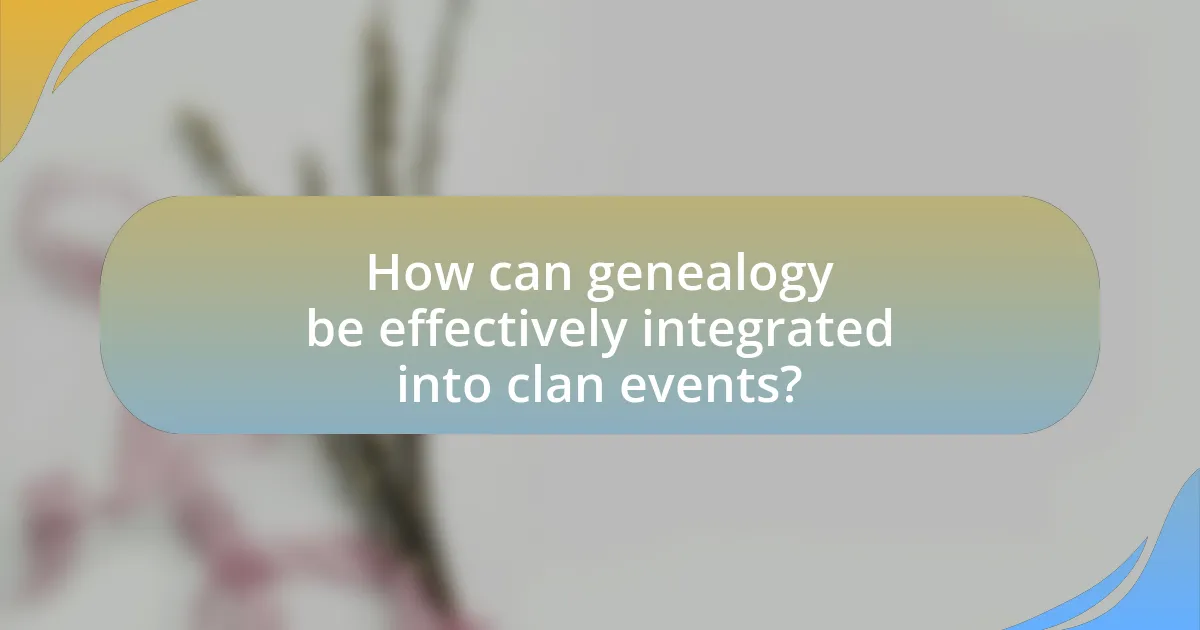
How can genealogy be effectively integrated into clan events?
Genealogy can be effectively integrated into clan events by incorporating family history presentations, interactive family trees, and storytelling sessions that highlight ancestral connections. These activities foster a sense of belonging and continuity among clan members, allowing them to engage with their heritage. For instance, using digital tools to create visual family trees can help participants trace their lineage and understand their familial ties, enhancing the overall experience. Research indicates that such interactive elements can significantly increase participant engagement and satisfaction during clan gatherings, as they provide a tangible link to the past and promote intergenerational bonding.
What methods can clans use to incorporate genealogy into their gatherings?
Clans can incorporate genealogy into their gatherings by organizing family tree presentations and storytelling sessions that highlight ancestral histories. These methods allow members to share their lineage, fostering a sense of identity and belonging. For instance, clans can create visual family trees that display connections among members, which can be presented during gatherings to facilitate discussions about shared heritage. Additionally, storytelling sessions can be organized where older members recount family stories and traditions, preserving oral histories that connect past generations to the present. This approach not only educates younger members about their ancestry but also strengthens familial bonds through shared narratives.
How can technology assist in showcasing genealogical research at events?
Technology can assist in showcasing genealogical research at events by providing interactive displays and digital tools that enhance visitor engagement. For instance, software applications can create family trees that attendees can explore on touchscreens, allowing them to visualize their lineage in an engaging manner. Additionally, virtual reality experiences can immerse participants in historical contexts related to their ancestors, making the research more relatable and impactful. Data visualization tools can also present complex genealogical data in an easily digestible format, such as infographics or timelines, which can help attendees understand their heritage more clearly. These technological advancements not only facilitate a deeper connection to family history but also attract a wider audience by making the information accessible and interesting.
What activities can promote genealogical exploration during clan events?
Genealogical exploration during clan events can be promoted through activities such as family tree workshops, storytelling sessions, and DNA testing initiatives. Family tree workshops allow participants to collaboratively build and visualize their ancestry, fostering connections among clan members. Storytelling sessions encourage sharing of personal histories and family legends, which can enrich the understanding of shared heritage. DNA testing initiatives provide scientific insights into lineage and ethnic backgrounds, enhancing the genealogical narrative with concrete data. These activities not only engage participants but also deepen their appreciation for their familial roots and connections.
What challenges might arise when integrating genealogy into clan events?
Integrating genealogy into clan events may present challenges such as data accuracy, participant engagement, and cultural sensitivity. Data accuracy can be problematic due to the potential for incomplete or conflicting genealogical records, which may lead to disputes among clan members regarding lineage. Participant engagement can be hindered if individuals are not interested in or do not understand the genealogical aspects being presented, resulting in a lack of enthusiasm for the event. Cultural sensitivity is crucial, as different clans may have varying traditions and beliefs about ancestry, which could lead to misunderstandings or offense if not handled appropriately. These challenges highlight the need for careful planning and consideration when incorporating genealogy into clan events.
How can clans address potential conflicts in family histories?
Clans can address potential conflicts in family histories by facilitating open communication and conducting thorough genealogical research. Open dialogue allows clan members to express differing perspectives and clarify misunderstandings regarding family narratives. Thorough genealogical research, which includes verifying historical records and utilizing DNA testing, provides factual evidence that can resolve disputes over lineage and heritage. For instance, studies have shown that DNA testing can confirm familial connections that may have been disputed, thereby reducing conflicts rooted in misinformation.
What strategies can be employed to engage all generations in genealogical discussions?
To engage all generations in genealogical discussions, utilizing interactive storytelling and technology is essential. Interactive storytelling allows participants to share personal narratives related to their ancestry, fostering a sense of connection and relevance across age groups. For instance, using digital platforms like family tree software or social media groups can facilitate sharing of family histories and photos, making the experience more engaging for younger generations who are accustomed to technology. Additionally, organizing family reunions or clan events that include activities such as genealogy workshops or storytelling sessions can encourage participation from all ages, as these settings promote dialogue and collaboration. Research indicates that multi-generational interactions enhance learning and retention of family history, making these strategies effective in bridging generational gaps in genealogical discussions.
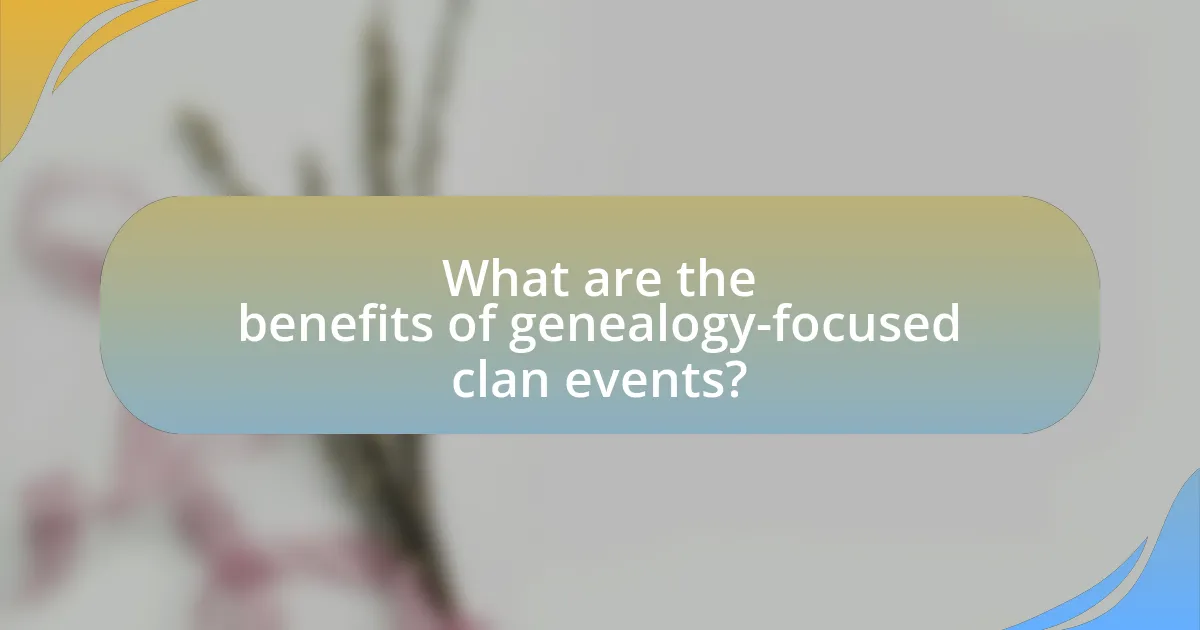
What are the benefits of genealogy-focused clan events?
Genealogy-focused clan events provide significant benefits by fostering connections among family members and enhancing cultural identity. These events allow participants to share and document their family histories, which strengthens familial bonds and promotes a sense of belonging. Additionally, they serve as a platform for preserving cultural heritage, as attendees often engage in storytelling and the sharing of traditions that have been passed down through generations. Research indicates that such gatherings can improve mental well-being by reinforcing social ties and providing a sense of purpose, as seen in studies highlighting the psychological benefits of family connections.
How do genealogy events contribute to community building?
Genealogy events contribute to community building by fostering connections among individuals who share common ancestry or heritage. These events create a platform for participants to exchange stories, resources, and knowledge about their family histories, which strengthens social ties and promotes a sense of belonging. Research indicates that community engagement through shared heritage can enhance social cohesion, as seen in studies highlighting the role of family reunions and local history events in uniting diverse groups around a common identity.
What impact does sharing genealogical knowledge have on clan unity?
Sharing genealogical knowledge significantly enhances clan unity by fostering a sense of belonging and shared identity among members. When individuals within a clan understand their ancestral connections and lineage, it cultivates a collective narrative that strengthens interpersonal bonds. Research indicates that clans with a well-documented genealogy report higher levels of cohesion and collaboration during clan events, as members feel more connected to their shared heritage. For instance, a study published in the Journal of Family History highlights that clans that actively engage in genealogical research and share findings experience increased participation in communal activities, reinforcing unity and collaboration.
How can genealogy events inspire younger generations to value their heritage?
Genealogy events can inspire younger generations to value their heritage by providing them with tangible connections to their family history and cultural roots. These events often include storytelling, sharing of family artifacts, and interactive activities that engage youth in learning about their ancestors’ experiences and traditions. Research indicates that when individuals participate in genealogy activities, they report a stronger sense of identity and belonging, which reinforces the importance of their heritage. For example, a study published in the Journal of Family History found that individuals who actively engage in family history research are more likely to feel a connection to their cultural background and express pride in their lineage. This direct involvement fosters appreciation and respect for their heritage among younger generations.
What best practices should clans follow for successful genealogy events?
Clans should follow structured planning, effective communication, and inclusive participation for successful genealogy events. Structured planning involves setting clear objectives, creating a detailed agenda, and allocating resources efficiently to ensure smooth execution. Effective communication is essential for engaging clan members, sharing information about the event, and encouraging participation through various channels such as newsletters or social media. Inclusive participation ensures that all members, regardless of their background or knowledge level, feel welcomed and valued, which can be achieved by offering workshops or discussions tailored to different interests and expertise levels. These practices enhance engagement and foster a sense of community, ultimately leading to more meaningful genealogy events.
How can clans ensure inclusivity in genealogical activities?
Clans can ensure inclusivity in genealogical activities by actively engaging diverse members and incorporating varied perspectives in their research and events. This can be achieved through outreach programs that invite participation from underrepresented groups within the clan, ensuring that all voices are heard and valued. For instance, clans can host workshops that educate members on the importance of inclusivity in genealogy, highlighting how diverse backgrounds enrich the understanding of family history. Additionally, utilizing technology, such as online platforms for sharing genealogical information, can facilitate broader participation, allowing members from different geographical locations to contribute. Research indicates that inclusive genealogical practices lead to a more comprehensive family narrative, as seen in studies that show diverse genealogical contributions enhance community ties and foster a sense of belonging among members.
What resources are available to support genealogy in clan events?
Genealogy resources available to support clan events include online databases, local historical societies, and genealogy software. Online databases like Ancestry.com and FamilySearch provide extensive records that help individuals trace their lineage and connect with clan members. Local historical societies often maintain archives of regional family histories and can offer assistance in research. Additionally, genealogy software such as Legacy Family Tree and RootsMagic allows users to organize and visualize their family trees, making it easier to present findings during clan gatherings. These resources collectively enhance the understanding of familial connections and heritage, which is essential for meaningful clan events.
